八年级下册英语期末复习
- 格式:doc
- 大小:28.00 KB
- 文档页数:3
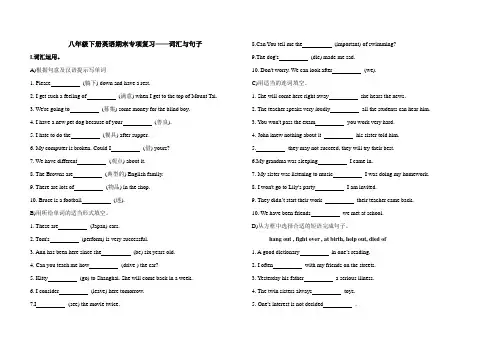
八年级下册英语期末专项复习——词汇与句子I.词汇运用。
A)根据句意及汉语提示写单词1. Please (躺下) down and have a rest.2. I get such a feeling of (满意) when I get to the top of Mount Tai.3. We're going to (募集) some money for the blind boy.4. I have a new pet dog because of your (善良).5. I hate to do the (餐具) after supper.6. My computer is broken. Could I (借) yours?7. We have different (观点) about it.8. The Browns are (典型的) English family.9. There are lots of (物品) in the shop.10. Bruce is a football (迷).B)用所给单词的适当形式填空。
1. These are (Japan) cars.2. Tom's (perform) is very successful.3. Ann has been here since she (be) six years old.4. Can you teach me how (drive ) the car?5. Kitty (go) to Shanghai. She will come back in a week.6. I consider (leave) here tomorrow.7.I (see) the movie twice. 8.Can You tell me the (important) of swimming?9.The dog's (die) made me sad.10. Don't worry. We can look after (we).C)用适当的连词填空。
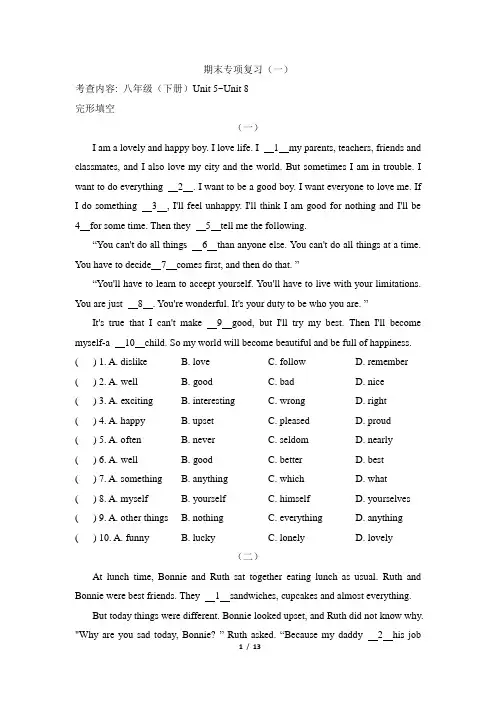
期末专项复习(一)考查内容: 八年级(下册)Unit 5~Unit 8完形填空(一)I am a lovely and happy boy. I love life. I 1 my parents, teachers, friends and classmates, and I also love my city and the world. But sometimes I am in trouble. I want to do everything 2 . I want to be a good boy. I want everyone to love me. IfI do something 3 , I'll feel unhappy. I'll think I am good for nothing and I'll be4 for some time. Then they5 tell me the following.“You can't do all things 6 than anyone else. You can't do all things at a time. You have to decide 7 comes first, and then do that. ”“You'll have to learn to accept yourself. You'll have to live with your limitations. You are just 8 . You're wonderful. It's your duty to be who you are. ”It's true that I can't make 9 good, but I'll try my best. Then I'll become myself-a 10 child. So my world will become beautiful and be full of happiness. ( ) 1. A. dislike B. love C. follow D. remember ( ) 2. A. well B. good C. bad D. nice( ) 3. A. exciting B. interesting C. wrong D. right( ) 4. A. happy B. upset C. pleased D. proud ( ) 5. A. often B. never C. seldom D. nearly ( ) 6. A. well B. good C. better D. best( ) 7. A. something B. anything C. which D. what( ) 8. A. myself B. yourself C. himself D. yourselves ( ) 9. A. other things B. nothing C. everything D. anything ( ) 10. A. funny B. lucky C. lonely D. lovely(二)At lunch time, Bonnie and Ruth sat together eating lunch as usual. Ruth and Bonnie were best friends. They 1 sandwiches, cupcakes and almost everything.But today things were different. Bonnie looked upset, and Ruth did not know why. "Why are you sad today, Bonnie? ”Ruth asked. “Because my daddy 2 his jobyesterday, ” she said. “And we may have to move. My mom and dad are very unhappy and they always argue(争吵). I am 3 .What is going to happen to us? ”Bonnie's news made Ruth very sad, too. What would life be like 4 Bonnie? What could she do to help her friend? When Ruth went home she told her mom the bad 5 .“What can I do to help? ”she asked.“I'm not sure, Ruth, ” said her mother sadly.Ruth thought and thought.“What can I do? ”she 6 .The next day was Saturday and Ruth woke up very early. She ate a quick breakfast, and then went to find her friends. They all decided to help Bonnie. The children 7 their money. They got three hundred dollars! Ruth's mom took them to the store and they bought food, soap and all kinds of things that a person might need.When they left the store they went to Bonnie's house and each of the children8 carried a bag to the door, rang the doorbell and ran. They had so much fun with9 secret surprise! They knew it would make Bonnie very happy.Ruth felt happy too, because she helped her friend. She knew it wasn't much, but all she needed to do was to show her friend that she 10 . I think Bonnie got the message, don't you?( ) 1. A. found B. made C. shared D. bought ( ) 12. A. changed B. lost C. enjoyed D. got( ) 3. A. worried B. lonely C. disappointed D. surprised ( ) 4. A. to B. with C. for D. without ( ) 5. A. story B. result C. news D. report ( ) 6. A. shouted B. laughed C. talked D. wondered ( ) 7. A. collected B. saved C. raised D. spent ( ) 18. A. usually B. quietly C. easily D. quickly ( ) 9. A. their B. his C. her D. its( ) 10. A. helped B. cared C. understood D. knew(三)We live in a busy world, so we really need to relax ourselves. But how to take a break when you can't get a vacation? Please take these 1 .Action One: Turn offWhen you are falling asleep, maybe there are some devices(设备)around you. It is one of the 2 why you can't have a good night's sleep. It's also why you can 3 awake(醒着的)in bed for hours, and wake up in a bad mood. So don't use any device 4 an hour before bed-turn them off.Action Two: Have your own timeA great way to avoid stress is to make sure you have some time just for 5 daily. You may read something interesting, listen to music, or just drink your coffee slowly and do 6 . It's your 7 time and no one can take it from you.Action Three: Meditate(冥想)It doesn't need to 8 a long time. You may just sit for 2 minutes and try to empty(清空)your mind. It can help your heart jump more slowly. It 9 makes your body in a good condition. So give it a try.That's 10 you can be relaxed and comfortable without having to take a vacation.( ) 1. A. ideas B. actions C. rules D. questions( ) 2. A. reasons B. facts C. result D. ways( ) 13. A. make B. come C. look D. stay( ) 4. A. less than B. more than C. at least D. at last( ) 5. A. myself B. yourself C. ourselves D. themselves ( ) 16. A. nothing B. anything C. everything D. something( ) 7. A. busy B. work C, free D. business( ) 8. A. take B. spend C. cost D. use( ) 9. A. too B. either C. never D. also( ) 10. A. why B. what C. when D. how(四)Clothes are important in our life. Different people wear 1 clothes. Now let's2 some people talking about clothes.Hello, my name's Betty. I started working this year, so I'm able to get new clothes more often 3 before. There are different people in my working place every day. If someone sees me in 4 once, I don't like to go out in it again. I like to wear bright colors and always dress up when I go to parties. I buy all kinds of clothes and I try to follow the latest way of 5 .Hi, I'm Jack. I don't have much to say about clothes. Shopping 6 clothes isn't really the way of life I'm interested in. Since I'm still at a college, I don't really mind7 . I have two jackets and I often wear 8 . I know least about the way of dressing.I don't like the serious look.My name is Alice. I'd like to say that my clothes have to be comfortable and make me 9 easy as soon as I put them on. Sometimes I buy clothes in some small markets-they're less expensive there. I go shopping for clothes about once a month, though. If I see 10 and fit for me, I would maybe go for it there and then.( ) 1. A. the same B. different C. beautiful D. comfortable ( ) 2. A. listen to B. hear C. to listen to D. to hear( ) 3. A. as B. like C. than D. long( ) 4. A. something B. anything C. nothing D. everything( ) 5. A. dress B. dressing C. dresses D. to dress( ) 6. A. of B. in C. for D. on( ) 7. A. what I wear B. what do I wear C. what I wore D. what did I wear ( ) 8. A. it B. them C. their D. they( ) 9. A. feel B. feels C. feeling D. to feel( ) 10. A. something comfortable B. anything comfortableC. comfortable somethingD. comfortable anything(五)Traffic rules help to keep order on the road. They also help to keeppeople__1__.The pedestrian(行人)has as many rules to__2__as the driver of a car. You shouldwalk on the sidewalk(人行道)or at the side of the road. Always look__3__before you walk across the street.If you like riding a bike, don't ride in the middle of the road or run__4__red traffic lights. When you ride a bike with a friend, don't look around or talk. If you drive a car, you should__5__at the traffic lights. You must always__6__a seat belt(安全带). Without belts__7__the driver and the passengers may be badly hurt in a sudden accident.You may not need to take a bus, but__8__if you have to travel in one. Get on or get off a bus only when it comes to a__9__. When it is full, don't try to get inside__10__you may fall off.Traffic rules are also called Road Safety rules. The maxim(格言)for all road users is “ Thinking ab out others”.( ) 1. A. healthy B. safe C. happy D. careful( ) 2. A. follow B. make C. break D. pass( ) 13. A. happy B. happily C. careful D. carefully( ) 4. A. through B. across C. along D. around( ) 5. A. speed up B. go ahead C. get off D. slow down( ) 6. A. take B. wear C. carry D. bring( ) 7. A. half B. none C. both D. all( ) 8. A. look around B. lake care C. take a seat D. look back( ) 9. A. sign B. stop C. corner D. crossing( ) 10. A. and B. so C. or D. but(六)I'm taking my family to other countries to have a trip. We are going by train 1 New York, and then take a ship to Europe. When we __2__ in Europe, we're going to some countries for sightseeing. We'll go to places__3__by train or by bus. We are planning to fly home.It __4__ us a long time to decide where to go, but I think we have planned a very __5__ tip. We will go to England, France and Italy. My wife is very interested in __6__ to France because she is a teacher of French. And my brother is looking __7__to a trip to Italy because he speaks Italian very well.We also __8__ about how we would go to Europe. At first we wanted to fly because it would be __9__ and would save more time. But my brother likes to take a boat trip and the children __10__ that, too. What do you think of my trip?( ) 1. A. to B. for C. in D. at( ) 2. A. got B. reach C. arrive D. get( ) 3. A. also B. too C. either D. neither( ) 4. A. paid B. took C. spent D. cost( ) 5. A. pleasure B. interested C. interest D. interesting( ) 16. A. looking B. going C. coming D. seeing( ) 7. A. forward B. after C. over D. for( ) 8. A. spoke B. told C. said D. talked( ) 9. A. faster B. fast C. quickly D. more quickly ( ) 10. A. have B. liked C. enjoy D. enjoyed(七)Many Americans like to have their holidays in__1__countries. One day an American__2__comes to China. This is her first time to China and she wants to__3__some friends there. She meets a Chinese. This Chinese wants to talk__4__with the American. When he sees her, he comes up and says“__5__”to her, then he begins his first talk with someone__6__an English-speaking country. “How old are you? ” the Chinese__7__. “ I'm__8__. Please don't ask a lady(女士)about her__9__, ” answers the woman. The Chinese is surprised. He doesn't know__10__. Can you help him?( ) 1. A. another B. the other C. other D. others( ) 2. A. man B. boy C. woman D. child( ) 3. A. make B. making C. having D. do( ) 4. A. with English B. with Chinese C. in English D. in Chinese ( ) 5. A. OK B. Hello C. Sorry D. Goodbye ( ) 6. A. in B. at C. of D. from( ) 7. A. says B. tells C. talks D. speaks( ) 8. A. sure B. worried C. glad D. sorry( ) 9. A. supper B. age C. job D. family( ) 10. A. how B. why C. what D. which(八)There was once a man who was very rich but very tightfisted(吝啬的)at the same time. Nobody__1__him in the village. One day he said to them, “I know you don't like me. When I__2__, I will give everything to you. Then everyone will be__3__. ”Even then nobody believed him. The rich man couldn't__4__why they didn't believe him. One day he went for a walk. Under a tree he happened to hear a pig and a cow__5__.The pig said to the cow, "Everybody likes you__6__nobody likes me. Why? When I provide people with meat, ham(火腿)and so on, I give three or four things to them. But you give only one thing-milk. Why do people like you__7__but not me? ”The cow answered, "Look, I give them milk while I'm__8__. They see that I am generous(慷慨的)with what I__9__. But you don't give them anything while you're alive. Only after you're dead do you give them meat, ham and so on. People don't believe in the__10__, they believe in the present(现在). If you give while you are alive, people will like you. "From that moment on, the rich man wasn't tightfisted any more. Everyone began to like him. And he felt quite happy.( ) 1. A. believed B. liked C. hated D. knew ( ) 2. A. die B. leave C. return D. arrive ( ) 3. A. frightened B. happy C. angry D. safe ( ) 4. A. agree B. understand C. remember D. forget ( ) 5. A. crying B. laughing C. singing D. talking ( ) 6. A. because B. so C. but D. or( ) 7. A. sometimes B. all the time C. at the beginning D. in the end ( ) 8. A. alive B. dead C. busy D. free ( ) 9. A. like B. have C. eat D. say( ) 10. A. lifetime B. competition C. friendship D. future期末专项复习(一)答案(一)1. B【解析】下文中有一个also说明这里指的也是同一种情况, 下文的动词是love, 所以这里也选love。
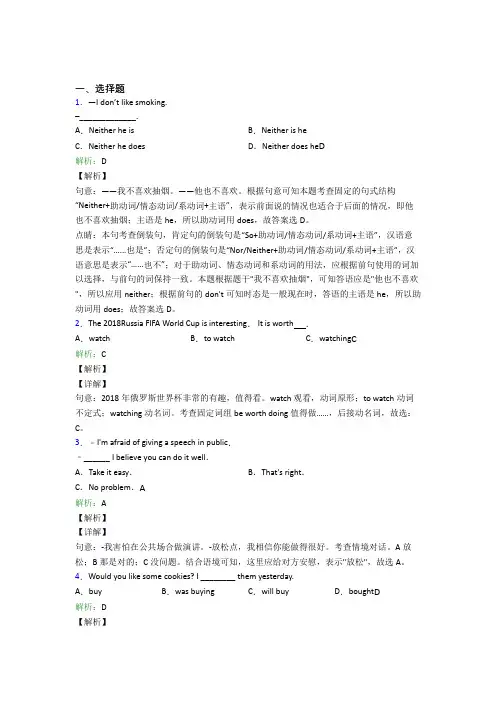
一、选择题1.—I don’t like smoking.─_____________.A.Neither he is B.Neither is heC.Neither he does D.Neither does he D解析:D【解析】句意:——我不喜欢抽烟。
——他也不喜欢。
根据句意可知本题考查固定的句式结构“Neither+助动词/情态动词/系动词+主语”,表示前面说的情况也适合于后面的情况,即他也不喜欢抽烟;主语是he,所以助动词用does,故答案选D。
点睛:本句考查倒装句,肯定句的倒装句是“So+助动词/情态动词/系动词+主语”,汉语意思是表示“…...也是”;否定句的倒装句是“Nor/Neither+助动词/情态动词/系动词+主语”,汉语意思是表示“…...也不”;对于助动词、情态动词和系动词的用法,应根据前句使用的词加以选择,与前句的词保持一致。
本题根据题干"我不喜欢抽烟",可知答语应是"他也不喜欢",所以应用neither;根据前句的don't可知时态是一般现在时,答语的主语是he,所以助动词用does;故答案选D。
2.The 2018Russia FIFA World Cup is interesting. It is worth .A.watch B.to watch C.watching C解析:C【解析】【详解】句意:2018年俄罗斯世界杯非常的有趣,值得看。
watch 观看,动词原形;to watch动词不定式;watching动名词。
考查固定词组be worth doing 值得做……,后接动名词,故选:C。
3.﹣I'm afraid of giving a speech in public.﹣______ I believe you can do it well.A.Take it easy.B.That's right.C.No problem.A解析:A【解析】【详解】句意:-我害怕在公共场合做演讲。
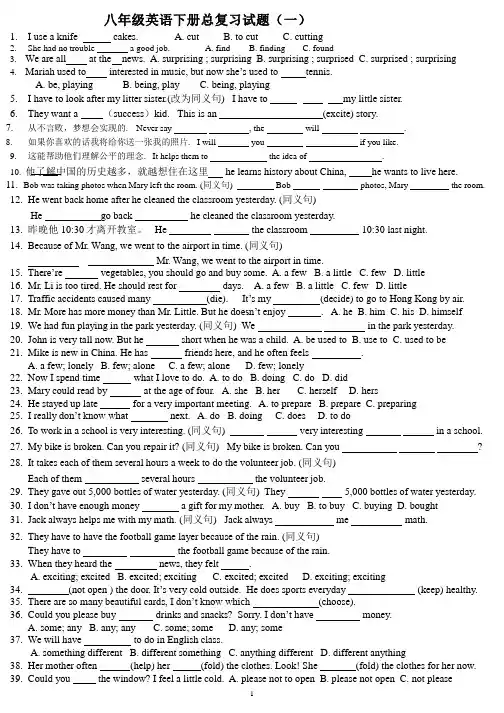
八年级英语下册总复习试题(一)1. I use a knife cakes. A. cut B. to cut C. cutting2. She had no trouble a good job. A. find B. finding C. found3. We are all_ at the news. A. surprising ; surprising B. surprising ; surprised C. surprised ; surprising4. Mariah used to interested in music, but now she’s used to tennis.A. be, playingB. being, playC. being, playing5. I have to look after my litter sister.(改为同义句) I have to my little sister.6. Th e y want a (success)k i d. Th i s i s an (excite) story.7. 从不言败,梦想会实现的. Never say , the will .8. 如果你喜欢的话我将给你送一张我的照片. I w ill you if you like.9. 这能帮助他们理解公平的理念. It helps them to the idea of .10. 他了解中国的历史越多,就越想住在这里h e lear ns h i s tor y about Ch i na, he wants to live here.11. Bob was taking photos when Mary left the room. (同义句) Bob photos, Mary the room.12. He went back home after he cleaned the classroom yesterday. (同义句)He go back he cleaned the classroom yesterday.13. 昨晚他10:30才离开教室。
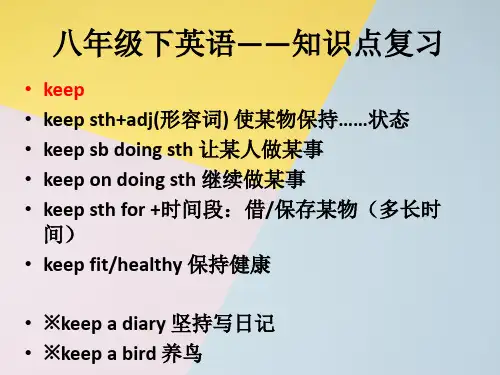
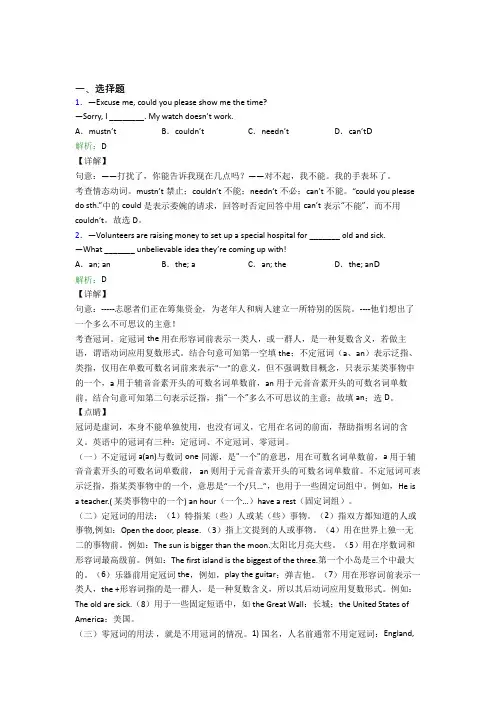
一、选择题1.—Excuse me, could you please show me the time?—Sorry, I ________. My watch doesn’t work.A.mustn’t B.couldn’t C.needn’t D.can’t D解析:D【详解】句意:——打扰了,你能告诉我现在几点吗?——对不起,我不能。
我的手表坏了。
考查情态动词。
mustn’t禁止;couldn’t不能;needn’t不必;can’t不能。
“could you please do sth.”中的could是表示委婉的请求,回答时否定回答中用can’t表示“不能”,而不用couldn’t。
故选D。
2.—Volunteers are raising money to set up a special hospital for _______ old and sick. —What _______ unbelievable idea they’re coming up with!A.an; an B.the; a C.an; the D.the; an D解析:D【详解】句意:-----志愿者们正在筹集资金,为老年人和病人建立一所特别的医院。
----他们想出了一个多么不可思议的主意!考查冠词。
定冠词the用在形容词前表示一类人,或一群人,是一种复数含义,若做主语,谓语动词应用复数形式。
结合句意可知第一空填the;不定冠词(a、an)表示泛指、类指,仅用在单数可数名词前来表示"一"的意义,但不强调数目概念,只表示某类事物中的一个,a用于辅音音素开头的可数名词单数前,an用于元音音素开头的可数名词单数前。
结合句意可知第二句表示泛指,指“一个”多么不可思议的主意;故填an;选D。
【点睛】冠词是虚词,本身不能单独使用,也没有词义,它用在名词的前面,帮助指明名词的含义。
英语中的冠词有三种:定冠词、不定冠词、零冠词。

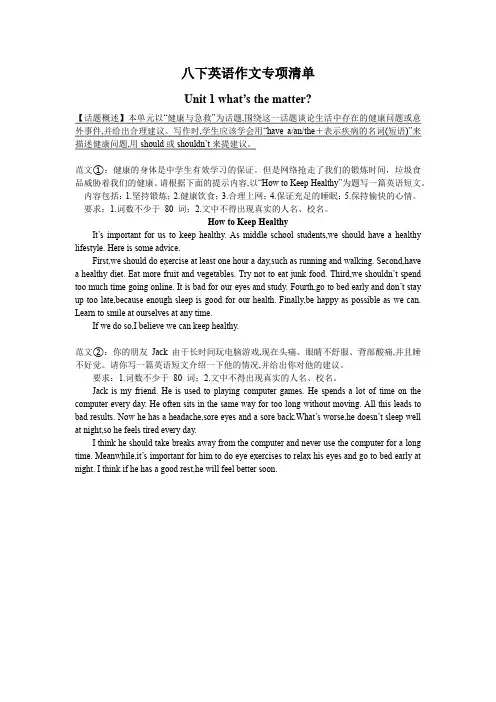
八下英语作文专项清单Unit 1 what’s the matter?【话题概述】本单元以“健康与急救”为话题,围绕这一话题谈论生活中存在的健康问题或意外事件,并给出合理建议。
写作时,学生应该学会用“have a/an/the+表示疾病的名词(短语)”来描述健康问题,用should或shouldn’t来提建议。
范文①:健康的身体是中学生有效学习的保证。
但是网络抢走了我们的锻炼时间,垃圾食品威胁着我们的健康。
请根据下面的提示内容,以“How to Keep Healthy”为题写一篇英语短文。
内容包括:1.坚持锻炼;2.健康饮食;3.合理上网;4.保证充足的睡眠;5.保持愉快的心情。
要求:1.词数不少于80 词;2.文中不得出现真实的人名、校名。
How to Keep HealthyIt’s important for us to keep healthy. As middle school students,we should have a healthy lifestyle. Here is some advice.First,we should do exercise at least one hour a day,such as running and walking. Second,have a healthy diet. Eat more fruit and vegetables. Try not to eat junk food. Third,we shouldn’t spend too much time going online. It is bad for our eyes and study. Fourth,go to bed early and don’t stay up too late,because enough sleep is good for our health. Finally,be happy as possible as we can. Learn to smile at ourselves at any time.If we do so,I believe we can keep healthy.范文②:你的朋友Jack由于长时间玩电脑游戏,现在头痛、眼睛不舒服、背部酸痛,并且睡不好觉。
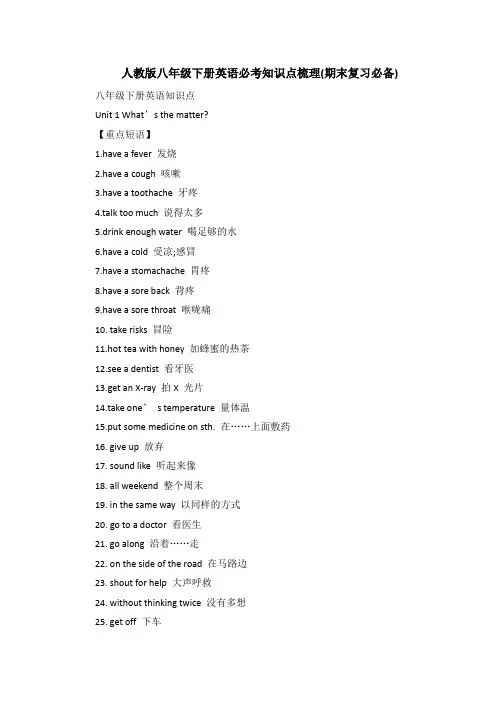
人教版八年级下册英语必考知识点梳理(期末复习必备)八年级下册英语知识点Unit 1 What’s the matter?【重点短语】1.have a fever 发烧2.have a cough 咳嗽3.have a toothache 牙疼4.talk too much 说得太多5.drink enough water 喝足够的水6.have a cold 受凉;感冒7.have a stomachache 胃疼8.have a sore back 背疼9.have a sore throat 喉咙痛10. take risks 冒险11.hot tea with honey 加蜂蜜的热茶12.see a dentist 看牙医13.get an X-ray 拍X 光片14.take one’s temperature 量体温15.put some medicine on sth. 在……上面敷药16. give up 放弃17. sound like 听起来像18. all weekend 整个周末19. in the same way 以同样的方式20. go to a doctor 看医生21. go along 沿着……走22. on the side of the road 在马路边23. shout for help 大声呼救24. without thinking twice 没有多想25. get off 下车26. have a heart problem 有心脏病27. to one’s surprise 另某人惊讶的是28. thanks to 多亏了;由于29. in time 及时30. make a decision 做出决定31. get into trouble 造成麻烦32. right away 立刻;马上33. because of 由于34. get out of 离开;从……出来35. keep on doing sth. 继续或坚持做某事36. put a bandage on sth. 用绷带包扎37. fall down 摔倒38. feel sick 感到恶心39. have a nosebleed 流鼻血40. cut his knee 割伤他的膝盖41. put her head back 把她的头向后仰42. have problems breathing 呼吸困难43. mountain climbing 登山运动44. be used to doing sth. 习惯做某事45. run out (of) 用完;用尽46. so that 以便47. so...that... 如此……以至于...…48. be in control of 掌管;管理49. in a difficult situation 在闲境中【重点句型】1. What's the matter with you?= What'the trouble with you? = What's wrong with you? 你怎么了?2. What should she do? 她该怎么办呢?3.Should I take my temperature? 我应该量一下体温吗?4.You should lie down and rest. 你应该躺下休息一会儿。
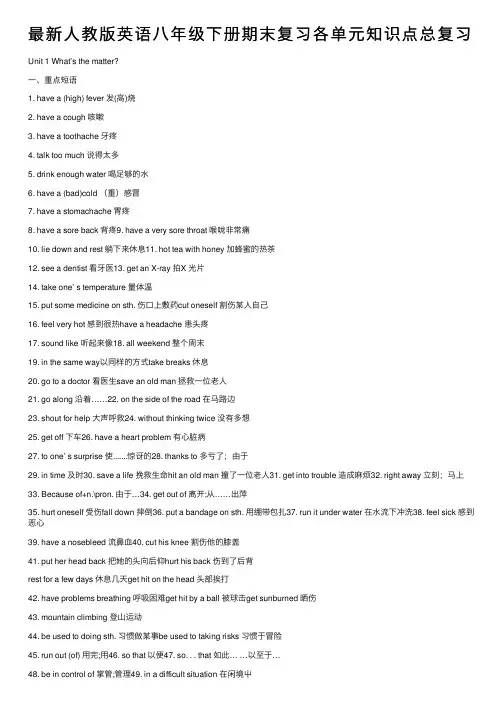
最新⼈教版英语⼋年级下册期末复习各单元知识点总复习Unit 1 What’s the matter?⼀、重点短语1. have a (high) fever 发(⾼)烧2. have a cough 咳嗽3. have a toothache ⽛疼4. talk too much 说得太多5. drink enough water 喝⾜够的⽔6. have a (bad)cold (重)感冒7. have a stomachache 胃疼8. have a sore back 背疼9. have a very sore throat 喉咙⾮常痛10. lie down and rest 躺下来休息11. hot tea with honey 加蜂蜜的热茶12. see a dentist 看⽛医13. get an X-ray 拍X 光⽚14. take one’ s temperature 量体温15. put some medicine on sth. 伤⼝上敷药cut oneself 割伤某⼈⾃⼰16. feel very hot 感到很热have a headache 患头疼17. sound like 听起来像18. all weekend 整个周末19. in the same way以同样的⽅式take breaks 休息20. go to a doctor 看医⽣save an old man 拯救⼀位⽼⼈21. go along 沿着……22. on the side of the road 在马路边23. shout for help ⼤声呼救24. without thinking twice 没有多想25. get off 下车26. have a heart problem 有⼼脏病27. to one’ s surprise 使.......惊讶的28. thanks to 多亏了;由于29. in time 及时30. save a life 挽救⽣命hit an old man 撞了⼀位⽼⼈31. get into trouble 造成⿇烦32. right away ⽴刻;马上33. Because of+n.\pron. 由于…34. get out of 离开;从……出萍35. hurt oneself 受伤fall down 摔倒36. put a bandage on sth. ⽤绷带包扎37. run it under water 在⽔流下冲洗38. feel sick 感到恶⼼39. have a nosebleed 流⿐⾎40. cut his knee 割伤他的膝盖41. put her head back 把她的头向后仰hurt his back 伤到了后背rest for a few days 休息⼏天get hit on the head 头部挨打42. have problems breathing 呼吸困难get hit by a ball 被球击get sunburned 晒伤43. mountain climbing 登⼭运动44. be used to doing sth. 习惯做某事be used to taking risks 习惯于冒险45. run out (of) ⽤完;⽤46. so that 以便47. so. . . that 如此… …以⾄于…48. be in control of 掌管;管理49. in a difficult situation 在闲境⼬lose one’s life 丧命cut off half his right arm 切除半边右臂bandage himself 给他⾃⼰包扎50. keep on doing sth. 继续或坚持做某事51. make a decision 做出决定the importance of making decision做决定的重要性52. take risks 冒险go mountain climbing 去爬⼭53. give up 放弃have a serious accident 遇到严重的意外54. talk about health problems谈论健康问题55. give advice 提建议⼆、重点句型1. What’ s the matter?What’ s the matter(with you)?= What’s the trouble (with you)?= What’ s wrong with you?你怎么了?I have a stomachache. 我肚⼦疼。
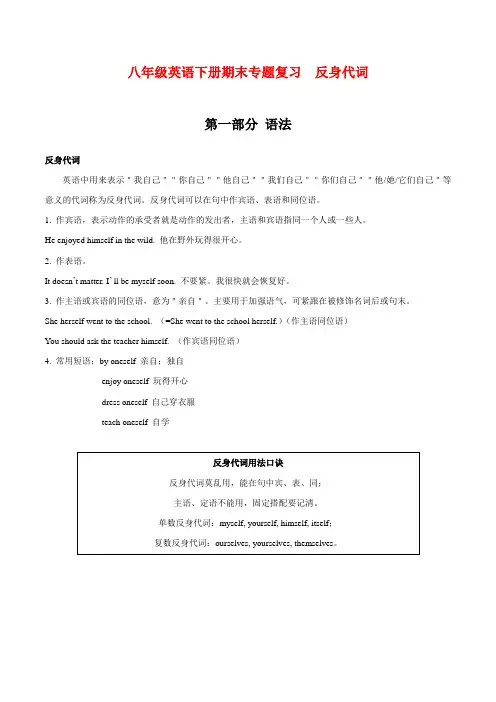
八年级英语下册期末专题复习反身代词第一部分语法反身代词英语中用来表示"我自己""你自己""他自己""我们自己""你们自己""他/她/它们自己"等意义的代词称为反身代词。
反身代词可以在句中作宾语、表语和同位语。
1. 作宾语,表示动作的承受者就是动作的发出者,主语和宾语指同一个人或一些人。
He enjoyed himself in the wild. 他在野外玩得很开心。
2. 作表语。
It doesn’t matter. I’ ll be myself soon. 不要紧。
我很快就会恢复好。
3. 作主语或宾语的同位语,意为"亲自"。
主要用于加强语气,可紧跟在被修饰名词后或句末。
She herself went to the school. (=She went to the school herself.)(作主语同位语)You should ask the teacher himself. (作宾语同位语)4. 常用短语:by oneself 亲自;独自enjoy oneself 玩得开心dress oneself 自己穿衣服teach oneself 自学第二部分反身代词专项训练一、单项选择1.Resolutions are promises to_________. They may help to make you a better person.A.you B.your C.yourself2.Don't worry about me. I'm old enough to think for .A.himself B.myself C.yourself3.My little brother David has grown up and he can look after ___________.A.he B.himself C.his4.Many people enjoyed ______ a lot at the opening ceremony of Pingyao International Film Festival on October 11th, 2018.A.itself B.himself C.themselves5.—Who taught ________ English?—Nobody. I learned it by ________.A.you; yourself B.your; yourself C.you; myself D.your; myself6.—Who taught _____ English?—Nobody. He learned it by ________.A.he; himself B.him; himself C.himself; him D.himself; himself7.If am not sure what's wrong with Tom, it's better for me to ask him ________.A.yourself B.itself C.myself D.herself8.I don’t think we should keep personal worries to ________. It’s best to talk to friends or family.A.we B.us C.ours D.ourselves9.-Do you often help your classmate with his English?-No. He learns English _____ .A.herself B.by herselfC.himself D.by himself10.(2017年四川南充)-Your uncle is very good at cooking! How did he learn it?-He learned it by _______ .A.him B.himself C.her D.herself11.The young girl always tried to make________ as beautiful as possible.A.yourself B.herself C.himself12.―Is Mary always willing to share things with others?―Yes. Whenever she reads an interesting story, she can't keep it to and wants to share it with her friends. A.she B.her C.hers D.herself13.Mr. Green taught _______ English in our school and taught_______ French at home.A.us, his B.him, us C.our, himself D.us, himself14.Peter gave ____ a baby dog to look after, but the dog hurt _______ when it fell from the tree.A.me; it B.myself; itself C.me; itself D.myself; it15.No one taught English. He taught as he was young.A.him; him B.him; himself C.himself; him D.himself; himself二、用所给单词的正确形式填空16.As a student, I should try to finish my homework by ________ (I).17.That bird is strong enough to look after________(it)18.The pretty girl looked at ________ in the mirror. (she)19.When we fail in an exam, we should tell________ not to give up halfway. (our)20.The house ________ (it) is not special to me, but I like its environment.21.If we can take better care of ________ (us), our parents will be less worried about us.22.My pat cat can find some food for ________ (it).23.My parents bought me some gifts but nothing for ________ (they) during the vacation.24.Miss Smith put her new dress on, and looked at ________ (she)in the mirror.25.You can’t move the desk all by ________ (your).三、根据首字母填空26.After her leg got hurt. Lucy quickly bandaged it by h_______.27.Watching the tea preparation is just as enjoyable as drinking the tea i______.28.The students in Class 8 went for a picnic last week and they all enjoy t________.29.It is impossible for him to finish such hard work all by h__________.四、完成句子30.昨晚他们过得很开心。
新⼈教版初中⼋年级下册英语期末专题复习(词汇专项训练)⼀、根据句意及⾸字母提⽰完成单词1. You can't get to the airport on time u you hurry up.(2017?贵港)2. The boys were e when they saw their basketball team win.3. They often b books from the library.4. It is reported that Beijing has a blind passengers to take the subway with their guide dogs.5. The scientist o all his money to the children's hospital.6. Paul didn't drive to the museum. I ,he rode his bike. (2018?贺州)7. Please r me that I should bring her a present for her birthday.8. The world's p is growing faster and faster. It has more than 7 billion.9. I e her to work hard and to try for the exam.10. It has been 20 years s I graduated from college.(2018?贺州)⼆、单项选择11. You should not eat ________ ice cream. It's not good for you.A. too muchB. much tooC. too manyD. many too12. —The population of the poor is getting smaller and smaller.—________ the government,their living conditions have improved.(2018?宜昌)A. As forB. Thanks toC. As a result ofD. Thanks for13. Many social workers went there to help________ clean water andfood to local people.A. put outD. give out14. Though he is________ at home, he doesn't feel ________,for he hasmany things to do.A. alone; lonelyB. lonely; aloneC. alone;loneD. lone; lonely15. The Internet is so closely connected with our daily life. Can you________ a life without it?A. understandB. imagineC. considerD. expect16. When you are swimming, ________ your ears. You can useearplugs(⽿塞) to stop water getting into your ears.A. take afterB. take part inC. take offD. take care of17. Mrs. Zhang is a famous actress. And she always speaks in a sweet________.A. musicB. noiseC. voiceD. song18. The ice and snow in Harbin is beautiful,so every winter________tourists come here. (2018?龙东)A. two million ofB. millions ofC. million of19. If we travel abroad,we prefer to stay in five-star hotels. That'sbecause they ________guests with the best service to make them feel at home. (2017?哈尔滨) A. preview20. —It's too late. I ________ that I may meet bad persons.—Don't worry. It is safe here.A. fearB. hideC. decideD. collect⼀、⽤所给单词的适当形式填空1. The little girl is so smart. She can make a cake by ________(she) without help. (2017?云南)2. I once asked him if he had any ________(difficult) in keeping fivechildren in school.3. I need ________ (silent) when I am studying. (2018?徐州)4. We all admire him because of his ________(kind) to every student.5. You are ________(fair), Mum. Why do you only want me to do chores?6. All the students had a discussion on language and ________ (communicate).7. The young man told the ________(true) while the policeman was questioning him.8. The couple have lived a happy life since they got ________(marry) 30 years ago.9. In ________(west) countries, people go to church at weekends.10. The baby pandas often die of ________(ill). They are hard to lookafter.⼆、单项选择11. Nancy took her temperature and found she had a ________.A. coughB. toothacheC. headacheD. fever12.Jimmy fixed up the old bikes and ________ to the poor.A. gave them awayB. gave it outC. gave out themD. gave up them13. The little boy ________ his seat to an old lady on the crowded bus.A. lent14. My father is going to New York by air tomorrow. He'll ________ next month.A. relaxB. comeC. returnD. arrive15. —I'm going to a job interview. I feel a little ________.—Take it easy. Some soft music can help you relax.A. nervousB. comfortableC. excitedD. happy16. —Don't smoke any more. It's bad for your health.—I'm trying to________. It's really hard, you know.A. turn it onB. put it offC. give it upD. take it out17. Xiongan New Area will help ________big problems in Beijing,such as traffic jams. (2017?济宁)A. set outB. check outC. work outD. give out18.—I think winter is a beautiful season,________ when it snows.—Me, too.A. luckilyB. especiallyC. probablyD. properly19. —________ have you talked with your friends on WeChat?—Since I finished my homework. (2018?莱芜)20. ________ the girls in my class have joined the music club.A. Three quarterB. Three quarter ofC. Three quartersD. Three quarters of⼀、根据句意及汉语提⽰完成单词1. There is a bookstore __________ (在……对⾯) our school. (2018?青岛)2. My mother doesn't like________(⽇本的)food.3. Tom began to show a special ________(兴趣)in painting in his childhood. (2018?⽇照)4. Do you know what the exact ________(⼈⼝) of China is? (2018?常州)5. We should do some things to________(保护)the environment.6. The river is over ten meters________(有……深的).7. Now the students are under too much________(压⼒). They have to study hard.8. You shouldn't________(借出)your books to others.9. About 10 passengers burned to________(死亡) in this traffic accident.10. He made a________ (决定)to go abroad after graduation. (2018?绥化)⼆、单项选择11. The girl can't see anything. She is ________.A. deafB. blindC. cleverD. lazy12. Scientists are trying their best to ________ ways to deal with theproblem.A. come up withB. look forward toC. talk aboutD. give up13. A robot show will be held in July,but________ knows the date forD. somebody14. Would you please ________ my baby brother while I'm cooking?A. take out ofB. take care ofC. take part inD. take after15. Students at Green High School often ________ books from their school library and can ________ them for a week.A. borrow; keepB. lend; keepC. borrow; borrowD. keep; borrow16. Parents should ________ a comfortable environment ________ their child.A. offer; withB. provide; forC. provide; toD. provide; with17. After I came back from shopping, I ________ I lost my wallet.A. watchedB. realizedC. hopedD. remembered18. Mr Black walked around and offered help________ we were doing an experiment. (2018?上海)A. whileB. althoughC. untilD. unless19. Don't give up. I believe you can ________ your dreams one day.A. riskD. accept20. ________,or we will not catch the train.A. Hurry upB. Be quietC. Be carefulD. Try out⼀、根据句意及⾸字母提⽰完成单词1. We should try our best to p the environment.2. There are lots of t visiting the Great Wall.3. The l in the room is poor, so I can't see anything clearly.4. They sat there in s .They didn't talk with each other.5. My bike is broken. Could you please l me yours?6. Don't p the door. Pull it, please.7. This desk is about 1.5 meters long and 0.7 meters w . (2017?海南)8. The old photo often r me of my happy time in middle school. (2017?黄⽯)9. N you nor John knows how to spell the word. (2017?荆门)10. Bob hasn't seen Kim s they graduated from high school.(2018?贵港)⼆、⽤所给单词的适当形式填空11. All of us heard the________ (laugh) from the house.12. Yesterday it snowed ________ (heavy) in the village.13. They stay at home instead of ________ (go) to the movies.14. My parents are________(German),but they need to live and work in England. (2017?黔南州)15. Junk food is bad for us, ________ (especial) for children.16. I'm feeling terrible. I have a ________ (stomach).17. I haven't seen them ________(recent). (2018?武威)18. —How much should I pay?—18 yuan in all,________ (include) the pen you picked out just now. (2018?常州)19. Last week the students went skating and enjoyed ________ (them) very much. (2017?上海)⼀、根据句意及汉语提⽰写单词1. Do you like ________(印度的) food? It's delicious.2. The photos bring back lots of good ________(回忆).3. The boy made up his mind to become an________ (优秀的) architect.4. ________ (⽆论什么) you say, I won't believe you any more.5. Goldilocks________(注意到) a little house,so she hurried towards it. (2017?聊城)6. China has been making many great ________(成就) in every field these years,which amazes the world. (2018?泰安)7. Mr Smith is sitting ________(在其中) a group of children,telling the story. (2017?贵港)8. They have decided to make use of the latest ________ (科技).9. The ________ (政府) is going to build a road through the mountains.10. The computer plays an important role in ________ (现代的) life.⼆、单项选择11. ________my surprise, Lily didn't go to Tom's birthday party.A. AtB. InC. ToD. With12. When your money________,please ask me for help.A. runs outB. is run out ofC. runs out ofD. was run out of13. —Whose bike is it?—It ________ to me. It's hers. (2017?天⽔)A. isn't belongedB. wasn't belongedC. didn't belongD. doesn't belong14. —Are you similar ________ your mother?—No. I take ________ my father.A. to; toB. after; afterC. after; to15. My bike is broken. I'll ________ tomorrow.A. fix up itB. fix it upC. put it upD. put up it16. The passage is too long. You should ________some sentences.A. cut outB. cut downC. cut inD. cut up17. —Driving after drinking always ________traffic accidents.—I agree. So we shouldn't drive after drinking.A. causesB. getsC. beginsD. ends18. Many foreigners came to our school last week,including three ________ and four________. (2018 ?凉⼭)A. German;AmericanB. Germans;AmericanC. Germans;AmericansD. German;Americans19. None of them talked. They finished their meal in ________.A. silenceB. orderC. placeD. public20. —Who ________ you here?—A policeman. We got lost and had to ask him for help.A. remindedB. foughtC. hidD. led1. He has lived in France for many years, but he can't speak Fwell.2. You must use some t to move the stone.3. In the desert, we can see s everywhere.4. Tom is such an h person that we all trust him. (2017?⽇照)5. Hard work is the key to s . (2017?⽇照)6. Watching too much TV is a w of time.7. Mr. Smith is getting married this Sunday and his w is a doctor.8. The students are singing here to r money for charity(慈善).9. I want to buy a new c to take some photos.10. The b policeman saved the boy from the burning building.⼆、根据汉语意思完成句⼦11. 26路公共汽车正⾏驶在中华路上,这时司机看到⼀位⽼⼈正躺在路边。
八年级下册英语期末复习——词汇与句子I.根据所给首字母或汉语提示填写单词。
1. I feel very cold. I think I have a high f .2.My sister collected many colorful s from Mount Huang.3. My computer doesn’t work. Can you help me r it?4. I’m really tired now. Let's have a r .5. Lisa's grandmother is sin hospital. She is going to look after her this afternoon.6. The earth is our home and we should p it.7. Robots do better than humans in some s .8. The twin sisters spent a wday shopping last Sunday.9. I didn't have a pen, so I used a pencil i .10. -Do you know the boy running tthe station?-Yes. He is my son.11. He is rich and has a lot of t , but he doesn't feel happy.12. My friends often eme to talk with them in English after class.13. You are too excited. You should cyourself14. There are about two tstudents in our school.15. I wanted to travel around the world by myself, but my parents didn't ame to do so.16. Twenty years has passed and I can't iwhat he looks like now. 17.Are you under too much(压力)?18. A piano stood(倚;靠) the wall.19. By hard working we can(达到;完成) anything.20. He fell(睡着) as soon as he lay down on the floor.21. Young people prefer going(到国外) to learn new skills.22. David and Edward are both football(迷).23. The boy never does his homework himself. He always (抄写) his classmates’.24. - Are your afraid of being(独自)at home,Linda?-No. I’ve grown up.25. He felt very(奇怪的) when he found nobody at home.Ⅱ.用括号中所给词的适当形式填空。
八年级下册英语期末复习——书面表达(一)David最近特别苦恼。
他的学习成绩退步很多,因为他迷恋上了电脑游戏,经常背着父母打游戏到深夜,白天有空就上网,父母知道后很生气,而他还与父母发生争吵。
David写信给朋友Lily,让Lily帮他解决这个问题。
请你以Lily的名义给他提供一些建议。
要点如下:1.不要玩游戏,游戏对眼睛不好,对学习有坏处:(play,bad)2.学会和朋友、父母沟通,和父母亲多交流,向父母道歉;(talk with,say sorry)3.……要求:1.对要点进行适当补充;2.100词左右,开头和结尾已给出,但不计入总词数。
Dear David,I know you are not happy these days,because you did badly in study.Yours,Lily(二)随着全球环境的恶化,越来越多的人选择过低碳生活。
请根据以下思维导图写一篇短文,倡议你的同学们加入低碳族。
要求:1.文中需包含思维导图中的主要内容;2.句子及篇章结构准确、连贯、书写规范;3.需做适量拓展;4.词数:80词左右。
(开头和结尾已给出,不计入总词数)With the global warming getting worse,more people choose to live a low-carbon life for the purpose of reducing greenhouse gases.Let's take action and be low-carbon people!(三)作为一部人类的“百科全书”,博物馆不仅是一个获取无限知识的大讲堂,还藏着一座城市的底蕴和故事。
你去过哪些博物馆呢?是典藏了人类自然文化的历史博物馆、自然博物馆?还是普及科学知识的科技博物馆、太空博物馆……?请谈一谈你去过的最棒的博物馆、在里面你参观了些什么、你从中学到了什么以及你的感受如何。
期末复习一一、课堂小考1.多亏;由于2.筹钱5.照顾6.比较;对比8.依……看9.其余的……;剩下的10.沉默;无声10.致力于二、单项选择1.couple of adults are talking about emperor in the picture.A.The;theB.The;anC.A;aD.A;an2.The girl couldn't believe her eyes when she saw in the mirror.3. If you take this train,you in Shanghai in five hours.A.arriveB.will arrive D.have arrived4. -Could you go to the movies with me now?-Sorry, I .It's too late.C.can'tD.couldn't5. There are many on the sea. They carry lots of silk to foreign countries.s6. A journey by train is than by bus.B.more relaxingC.most relaxingD.the most relaxing7. - What kind of sport do you like? -Ball games, basketball.8. -Never .I believe you can do it. - Thank you, Mom. I'll try my best.A. give upB.die downC.fall overD.give away9.When we got to Chengdu Research Base,a panda bamboo.B.will eatC.is eatingD.was eating10. -have you been at this school? -Since 1990.A. How longB. How muchC. How soonD. How often11. -Dr. White, I have sore neck. -You'd better X-ray.A.the;theB.a;theC.the;anD.a;an12.-What's the matter with your brother? -has a cold.A. SheB. HeC. HistD. Her13. Mary he ball to Linda and Linda threw the ball to the basket at once.D.will pass14. -Robert,could you bring the tea set for me? -Yes, I . I'm coming, Dad.B.couldn't D.can't15. Jane finally chose history because of her in the subject.16. The Great Wall is one of man-made objects in the world.B.more famousC.the famousD.the most famous17. -Lucy,what were you doing at nine last night?-I the piano. I usually practice the piano at that time.A.play C.was playing D.am playing18.We all want to know who can the physics problem. You know,it's very difficult.A.work outB.take outC.set upD.give up19.-Jenny,you look so beautiful in your new dress.-Thanks! I it for several times.A.Wear C.was wearing D.have worn20.The article encourages us food.A.not wasteB.not to wasteC.no wastingD.no waste三、完形填空Diana sat down on the sofa and touched her head. She wasn't feeling well. Her 1 was getting worse and worse.Diana was nine years old. About two hours ago, her mother went down the street to visit Mrs. Smith. She didn't know that Diana was 2 . And she thought Diana was old enough to stay at home by 3 . Diana 4 the TV. She expected that watching TV could make her 5 about the headache. However,it didn't help. She turned off the TV and decided to 6 for some time. She went to her bedroom and 7 on the bed. However,she couldn't fall asleep.She got up and took a washcloth(毛巾).She made it 8 with cold water. Then,she put it on her head.Lying down on the bed with the washcloth on her head, Diana started to feel a little better, 9 the washcloth didn't stay cold for long. Her head began to ache again.Diana thought to herself, “Being at home by myself isn't fun at all. I 10 Mom so much.”1.2.4. A. turned on B.looked for C.heard from D.shouted at7. A.fell down y sown C.put down D.write down1四、阅读理解How fit are your teeth? Are you lazy about brushing them? Never fear: An inventor is on the case. An electric toothbrush senses how long and how well you brush, and it lets you track (追踪) your performance on your phone.The Kolibree toothbrush was exhibited at the International Consumer Electronics Show in Las Vegas this week. It senses how it is moved and can send the information to an Android phone or iPhone via a Bluetooth wireless connection.The toothbrush will be able to teach you to brush right (don’t forget the insides of the teeth!) and make sure you’re brushing long enough. "It’s kind of like having a dentist actually watch your brushing on a day-to-day basis, " says Thomas Serval, the French inventor.The toothbrush will also be able to talk to other applications on your phone, so developers could, for instance, create a game controlled by your toothbrush. You could score points for beating monsters among your teeth. "We try to make it smart but also fun, " Several says.Serval says he was inspired by his experience as a father. He would come home from work and ask his kids if they had brushed their teeth. They said "yes," but Serval would find their toothbrush heads dry. He decided he needed a brush that really told him how well his children brushed.The company says the Kolibree will go on sale this summer, for $99 to $199, developing on features. The U.S. is the first target market.Serval says that one day, it’ll be possible to replace the brush on the handle with a brushing unit that also has a camera. The camera can even examine holes in your teeth while you brush.61. Which is one of the feature of the Kolibree toothbrush?A. It can sense how users brush their teeth.B. It can track users' school performance.C. It can detect users' fear of seeing a dentist.D. It can help users find their phones.62. What can we learn from Serval's words in Paragraph 3?A. You will find it enjoyable to see a dentist.B. You should see your dentist on a day-to –day basis.C. You can brush with the Kolibree as if guided by a dentist.D. You'd like a dentist to watch you brush your teeth every day.63. Which of the following might make the Kolibree toothbrush fun?A. It can be used to update mobile phones.B. It can be used to play mobile phone gamesC. It can send messages to other usersD. It can talk to its developers.64. What can we infer about Serval's children?A. They were unwilling to brush their teethB. They often failed to clean their toothbrushes.C. They preferred to use a toothbrush with a dry head.D. They liked brushing their teeth after Serval came home.65. What can we learn about the future development of the Kolibree?A. The brush handle will be removed.B. A mobile phone will be built into it.C. It will be used to fill holes in teethD. It will be able to check users' teeth五、任务型阅读“Without music,life would be a mistake,"famous German philosopher(哲学家)Friedrich Nietzsche said over a century ago. Music is a big part of our daily lives.But in recent years, some US schools have cut out music classes to control budgets(预算).For example,Chicago public schools hurt arts education when it fired(开除)over 1, 000 teachers.Among them,10 percent of students are busy with schoolwork, so parents and students choose to focus on subjects that are tested more often.However,learning music is beneficial(有益的)in many ways.When playing music, you need different abilities to work together. It is not as simple as it looks, according to Kenneth Guilmartin of Music Together,an early childhood music development program. For example,when playing the piano,people see music notes and decode(解码)them in their brains. They also use their fingers to make sounds. You need to deal with all these things at the same time.Music has a special connection with science as well. You can see that many scientists are good at playing music: Einstein played the violin,and German physicist Max Planck was talented in playing the piano.1.题完成句子;2、3题简略回答问题;4题找出并写下第四段的主题句;5题将文中画线句子译成汉语。
初二下期末复习资料一、主要语法点1、系动词:表示主语“是什么”或“怎么样”的词。
它本身有词义,但是不能单独做谓语,后面必须跟表语(形容词、名词等),构成系表结构来说明主语的状况、性质、特征等。
系动词可分五类:a、表示“是”的系动词be,表示主语的特征、状态或性质。
b、表示保持一种状态或态度的连词,如:keep,stay,remain等。
c、表示一种状态转变为另一种状态的连系动词,如:become,get,grow,turn,go等。
d、表示“看起来”的连系动词,如:look,seem,appear。
e、表示其他感官感觉到的系动词,如:feel,smell,taste,sound。
2、状语从句a、原因状语从句表示主句所发生的原因或理由。
通常用because,as,since和for引导。
because 用于回答why的提问,可放句首,也可放句尾。
as和since语气弱,用来表示非常明显的原因或者对方已经了解的原因,一般放句首。
for表示的原因不是直接原因,而是多种情况的推测,是一种补充说明,因此一般不在句首。
b、时间状语从句,要注意时态一致。
一般情况下,主句是一般将来时,从句用一般过去时。
主句是过去时态,从句也要相应用过去时态。
连接词有:when,while,as,before,after,since,till,untill等。
●表示同时性,即主从句的谓语同时发生或者几乎同时发生。
when(当……的时候),while,as soon as,as,onec,等。
●表示先后,即主句的谓语动作发生在从句之前或之后。
after=when(在……之后),before●表示持续或瞬间性。
since(自从),until(直到…才),till(直到……才)until用于肯定句中,表示主句的动作一直持续到从句动作发生或状态出现时为止。
这种用法中,主句的谓语动词必须是持续性动词。
如live,wait,last,love,like,stay,work等。
eg:He waited for his father until it was 12 o’clock.until用于否定句中,表示主句的动作在从句的动作发生之前尚未发生,或者说主句的动作在从句的动作发生之后才开始。
此句型为“not…until…”直到……才……,此时谓语可以是非持续性动词。
eg: He didn’t come back until he finished all the work.c、条件状语从句由if,unless(除非),in case(万一),as long as(只要)等词引导。
条件状语从句同时间状语从句一样,谓语动词常用一般现在时表示将来。
eg:If it doesn’t rain tomorrow, we’ll go to the park.d、结果状语从句表示主句的动作所引起的结果,可以用so…that, such…that等引导。
●在so…that结构中,so是副词,与形容词或副词连用,结构是so+adj/adv +that从句。
在such…that结果中,such是形容词,后面跟可数或不可数名词。
结构是:such+a(n)(+adj.)+单数名词+that从句He is such a(n)(honest)boy that everybody likes him.such(+adj)+复数可数名词+that从句He had such long arms that he could almost touch the ceiling.such(+adj)+不可数名词+that从句It was such bad weather that I had to stay at home.●当名词前有many,much,few,little等表示数量多少的词修饰时,用so,不用such。
●当单数名词前有形容词时,即可用so,也可用such,但不定冠词的位置却不同。
eg:This is such an important meeting that you should attend.= This is so important a meeting that you should attend.●so that既可以引导目的状语从句,也可以引导结果状语从句。
3、使役动词:就是叫别人去做事情。
常见的动词有let,make,have,get等,加了宾语后,可用动词原形或不定式短语(to+动词原型)4、动词不定式:由“to+动词原型”构成。
常用词begin, want,hope,forget,remember,like ,need,try,ask等。
●感官和使役动词let,make,listen to,feel,hear,see,watch等,动词不定式不带to。
eg:My parents don’t let me swim in the river.●常用it作为形式主语,动词不定式放在谓语或表语后。
如果说明动词不定式的动作是谁做的,可在不定式前加一个for sb,做逻辑主语。
如果表语是kind,nice,right,wrong,good,clever等描述行为者本身的性格、品质的形容词时,应该在不定式前加of sb,做逻辑主语。
eg:It’s difficlut for us to finish the work.. It’s very kind of you to help me.●动词不定式短语可以和疑问词what,which,how,where,when等连用。
5、宾语从句:就是一个句子在另一个主句中作宾语。
●由连词that引导的宾语从句,that可以省略。
●由if或whether引导,意为“是否”,“是不是”。
语序用陈述语序(主语+谓语)。
连接词不能省略。
●whether和if引导宾从时通常可以互换。
但以下情况,whether不可以换成if。
1)whether之后紧跟or not时。
eg: I don’t know whether or not it rains.2)whether引导主语从句位于句首时。
eg: Whether they will go by air or by train hasn’t decided.3)whether用在带有to的动词不定式前。
eg: Please tell us wheather to go or stay.4)有些动词(如discuss)后面只能跟whether,不能跟if。
eg: We discussed whether we should let him leave.●主句使用现在时时,从句允许使用任何时态。
从句可以与主句一致,也可以由从句的时间状语自行决定。
eg: I think you are right.●主句用过去时,从句要用过去时态的某种形式。
eg: I didn’t think he was wrong yesterday. 我认为他昨天没错。
(从句有yesterday,用一般过去时)●如果宾语从句陈述的是客观真理,事实等,其时态不受上述限制,用一般现在时态。
eg: The teacher told me the earth is round. 老师告诉过我,地球是圆的。
6、形容词的同级比较:A=B●A+be+as+形容词原级+as+B eg: This classroom is as large as that one.●否定:A+be+not+as/so+形容词原级+as+B “A不如B那么……”eg: Helen is not as/ so thin as her sister. ●表示倍数,如“一半/两倍/三倍…”half/ twice/ three times…+as…as…eg: You are not half as clever as you think you are. 你还没有你自认为的一半聪明。
7、副词的比较级和最高级●A+动词+副词的比较级+than+B “A做某事比B更……”eg: His brother worked harder than him.● A like(s)…better than B “和B比起来,更喜欢A”eg: She likes dancing better than singing.●less+原级+than “……不如……”eg: He walks less slowly than his sister.●比较级+and+比较级“越来越……”eg: He got worse and worse, so he didn’t go to work.●the+比较级,the+比较级“越……,越……”eg: The harder you work, the more you get.●倍数+as…as = 倍数+比较级+than “几倍于……”eg: This kind of plane flies twice as fast as that kind. = This kind of plane flies twice faster than that kind.●用much,far,still,a lot等副词来修饰副词的比较级时,表示程度,放在比较级之前。
eg: The problem is much harder than that one.8、其他重要语法●one of +(形容词最高级)+可数名词复数做主语时,谓语动词用单数。
eg: One of the bags is mine.●none of…做主语,谓语可用单数,也可用复数。
none 用来回答How many 引导的特殊疑问句。
二、易混淆词组1、…ed形容词与…ing形容词的区别:如,interested与interesting surprised 与surprising等…ed形容词表示“感到……的”,主语是人。
…ing形容词表示“令人……的”,主语为物。
2、because+从句because of+短语instead 一般放在句子后面,其后不加被代替的内容。
eg: If you are busy, you can come another day instead. instead of +被代替的部分。
eg: I went there by bus instead of on foot.3、experience 解释成经历时,可数。
解释成经验时,不可数。
exercise 解释成练习时,可数。
解释成锻炼时,不可数。
4、think over 仔细考虑,慎重考虑think about 想,考虑think of 想起,认为eg: What do you ___________________ the film?Did you ____________________ going there by plane?He would like more time to ___________ things ________.5、noisy嘈杂的,喧闹的,是noise的形容词。